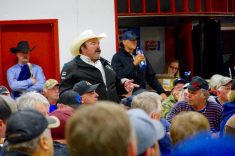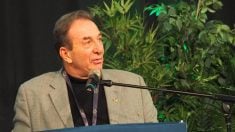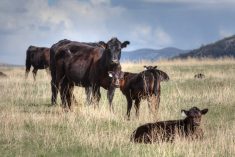The province has released more details on its plan to increase Manitoba vet student seats at the Western College of Veterinary Medicine (WCVM).
In particular, Manitoba Agriculture Minister Derek Johnson says his department will work with the college to target future poultry and large animal veterinarians.
“The health of these animals is the most visible reason that veterinarians are needed in rural Manitoba,” he said, also noting the veterinary role in monitoring disease and stemming animal disease outbreaks.
Read Also

Trade uncertainty, tariffs weigh on Canadian beef sector as market access shifts
Manitoba’s beef cattle producers heard more about the growing uncertainty they face as U.S. tariffs, and shifting trade opportunities, reshape their market.
Why it matters: The shortage of ag veterinarians is a national issue, with many new vets instead opting for companion animals and a less remote clientele.
The goal is to attract and train those students most likely to return to their home province to set up shop, says Johnson.
Students filling the extra seats must have a desire to work with commercial agriculture in rural Manitoba and have “practical knowledge and experience in the livestock or poultry industries, gained through significant experience prior to enrolment,” said an early October news release.
[RELATED] Province funds new vet student seats
“We know from many studies that students who come from a rural background or live in small towns are more likely to go back and to work in small towns or in rural areas,” said WCVM dean Dr. Gillian Muir.
Students must also have completed a university-level animal science course before applying.
The province has said that a more technical requirement list should be ready by 2024-25.
“Of course, we’re excited about these new college seats being filled by Manitoba students and look forward to the applications process moving forward,” Johnson said.
Vet shortage
The additional information follows an announcement that the province would increase funding for the vet college, which is based at the University of Saskatchewan in Saskatoon. Additional funds will increase the subsidized seats for Manitoba students from 15 to 20 per year, starting in 2023-24.
The province plans an extra $540,000 in contributions to fund the new WCVM seats. That increases Manitoba’s overall funding of the school to just over $7 million in the first year of the expansion. By 2024-25, the province expects to contribute $7.6 million in total.

Once established, the province says 80 veterinarian hopefuls from Manitoba will be enrolled in the four-year course at any given time, compared to 60 now.
Johnson said the province has also increased funds to another program that subsidizes the wages of third-year veterinary students who return to Manitoba.
Muir said there is a huge demand for veterinarians in rural areas and small towns.
“We’re seeing that in our students that are graduating now. They’ve got multiple, multiple offers and there’s a lot of clinics that are looking for vets.”
Tyler Fulton, president of the Manitoba Beef Producers, was on the front line of the vet shortage earlier this year. His farm had to scramble for options in July after his veterinarian in Shoal Lake retired.
“Our directors frequently hear from producers who are having difficulty accessing vets locally, be it for regular herd health matters or for emergency care,” he said.
[RELATED] Cattle crunch: Tug of war on herd rebuilding prospects
The flip side of that is the crushing workload laid on veterinarians that remain. Fulton’s organization has joined other producer groups to raise the alarm about the shortage of large animal vets.
The new seats are “a huge step forward,” in addressing that gap, said Fulton.
“We appreciate, in particular, recruiting students who have a direct interest in the first-hand experience of working with animals and who have been raised in a rural environment,” he said. “They have a unique understanding of animal agriculture, life in rural Manitoba and the opportunities and challenges that go with that.”
Muir expects the extra seats will ease some of the demand for ag vets.
“It’s a sound investment in protecting the health and wellness of livestock,” she said, noting the financial role those livestock play in rural economies.
The college receives about three applications for every available Manitoba seat, Muir estimated.
“Announcements like this, we know they’re going to increase our demand, because there’s going to be students who say, ‘Hey, I can get some of these seats. There’s more seats now for Manitoba students.’ There’s this myth out there that it’s crazy hard to get into vet school. It’s not, if you’ve got this kind of background,” Muir said.
















